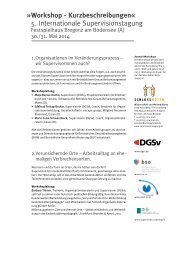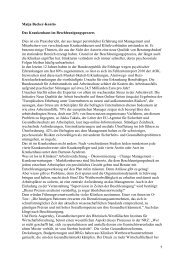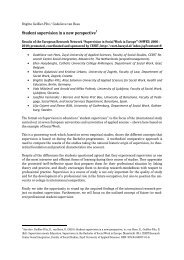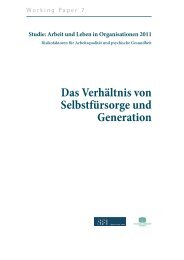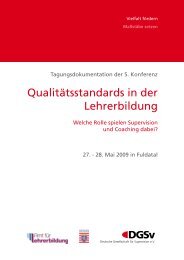Internationale Institutionen und nichtstaatliche Akteure
Internationale Institutionen und nichtstaatliche Akteure
Internationale Institutionen und nichtstaatliche Akteure
Erfolgreiche ePaper selbst erstellen
Machen Sie aus Ihren PDF Publikationen ein blätterbares Flipbook mit unserer einzigartigen Google optimierten e-Paper Software.
tegrate a cosmopolitan dimension into their<br />
“radically incomplete identity”. This last<br />
point is highlighted for instance by Homi K.<br />
Bhabha, Professor at Harvard University and<br />
one of the most important figures in contemporary<br />
post-colonial studies.<br />
You both mention “burden-sharing” as one<br />
of the main ideas of fair global governance.<br />
International negotiations such as, most recently,<br />
Copenhagen have shown that different<br />
countries apparently have very different<br />
views on the “burden” they ought to carry.<br />
How can we reach a common <strong>und</strong>erstanding<br />
on global justice?<br />
Fues: In my view, global norm-creation<br />
should be considered as a double-track process:<br />
deductively from above – for example<br />
distilling common gro<strong>und</strong> from world religions<br />
– and inductively from below. A nice<br />
example for the second kind of approach is<br />
given by the current proposals for global climate<br />
policies, particularly regarding the allocation<br />
of the remaining environmental space<br />
– the so called “sink capacity” – for greenhouse<br />
gas emissions. Policy-makers from Indian<br />
prime minister Manmohan Singh to<br />
German chancellor Angela Merkel, as well<br />
as scholars, do agree that the available environmental<br />
space should be distributed on an<br />
equal per capita basis – meaning that each person<br />
on this planet would ultimately receive<br />
the same emission quota. This, multiplied by<br />
the population of a particular country, would<br />
lead to the national emission quota. If nations<br />
would agree to that formula in climate policies,<br />
the principle of equal per capita rights to<br />
the global commons could be applied to other<br />
kinds of transnational environmental goods.<br />
This would represent a powerful component<br />
of global ethics coming from concrete intergovernmental<br />
dialogue and negotiations.<br />
Mallavarapu: When talking about a common<br />
<strong>und</strong>erstanding of global values, we have<br />
to make sure first of all that the provincial<br />
– any hegemon’s values – is not masquerading<br />
as the universal yet again. Let me give you an<br />
example: The first generation of human rights<br />
focused more exclusively on civil and political<br />
rights, while the developing world was keen<br />
to lodge economic and social rights as equally<br />
f<strong>und</strong>amental in a charter of human rights.<br />
The second generation of human rights eventually<br />
incorporated these rights more square-<br />
ly. This suggests that there may be alternative<br />
maps in terms of a hierarchy of values, in<br />
other words, there may be different answers<br />
to the question: What matters most? A solution<br />
to this problem would be to register<br />
these different maps and bring them into conversation.<br />
But this will be difficult – though<br />
not impossible – to achieve. Even within domestic<br />
spheres the establishment of common<br />
norms and a national identity are contested,<br />
and this is particularly glaring in situations of<br />
ethno-national polarisation such as between<br />
the Sinhalas and Tamils as witnessed until recently<br />
in Sri Lanka.<br />
“Why always refer only to Kant?”<br />
You mention the establishment of a common<br />
identity at the national level: Can the process<br />
towards more global governance be compared<br />
to the state-building processes as they<br />
took place in Europe during the 19 th century,<br />
for example?<br />
Mallavarapu: The analogy is certainly<br />
limited. Governance beyond the bo<strong>und</strong>aries<br />
of the nation-state poses its own set of problems.<br />
While there is growing recognition that<br />
distinguishing too sharply between the domestic<br />
and the international is certainly inadequate,<br />
there still remain some dif feren ces.<br />
For the process of nation-building, clear devolution<br />
of structures is essential. Governance<br />
internally is about governments, about sovereignty<br />
and constitutionalism, all aspects<br />
which are relatively weaker outside the domestic<br />
sphere. So the f<strong>und</strong>amental issue at the<br />
international level would be to achieve governance<br />
in the absence of government. How<br />
do we establish a body of regulations without<br />
having a supranational authority? How do we<br />
arrive at universally acceptable standards?<br />
Fues: The difference at the global level is<br />
that no world government is in sight nor is<br />
it desirable. Rather, global governance has to<br />
rely on the motivation for voluntary association<br />
and collaboration. The incentives for this<br />
will increase as the benefits of shared sovereignty<br />
become more obvious in the face of<br />
global interdependencies. Rather than looking<br />
for national models, it might be useful to<br />
look at the formation of regional blocks like<br />
the European Union (EU) or the Association<br />
of Southeast Asian Nations (ASEAN). The<br />
APuZ 34–35/2010 9





